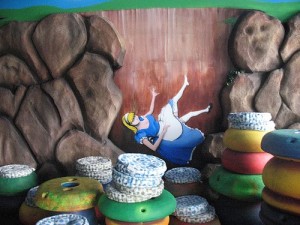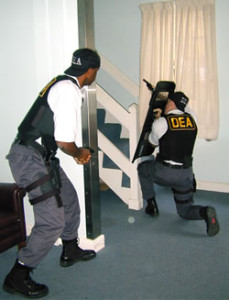Clare’s post yesterday about NaNoWriMo reminded me of something I wrote awhile back when I was blogging over at Killer Hobbies (KH is a great blog about mysteries that incorporate crafts, by the way). Back then I’d never heard of NaNoWriMo (maybe the contest hadn’t even been invented yet), but I’ve always known I could never survive a rapid writing marathon. Here’s a recap:
Maybe I’ve been watching too much Top Chef on TV this week, but my two obsessions in life—writing and food—have started to converge.
Because I’m on a killer deadline right now, I’ve been doing some stressed-out musing about my personal writing practices. And I’ve decided that as a writing “chef,” I am a slow cooker. You could even call me a crock-pot.
My forward progress through the first draft of a novel is chunky and irregular, like an ice cutter breaking its way across a packed-solid river. There’s the occasional hang-up on the ice as I stall for a few days, working and reworking difficult sections. My average forward progress rarely exceeds a page a day. Barely tugboat speed, in other words.
On the plus side, I write every day. Every day, at the same time of day: before dawn. Over the past year, I’ve missed only two days of writing—once when I was stuck in an airplane (when I fly, I can’t concentrate on anything more challenging than a Danielle Steel novel). And once when I was retching my guts into the toilet from a bout of stomach flu.
As a writer who produces at this relatively stately pace, I reel in shock and awe when I read that some writers can tap out thousands of words a day. In the great writing kitchen of life, these people must be the flash fryers .
My best friend from college is a flash fryer. As a student she redefined the time-honored, collegiate art of procrastination. She’d wait until well past midnight to start a paper that was due at eight a.m. the next morning. Finally, in a Selectric burst of typing and crumpled pages, she’d bang out her essay. And receive an A. One time she procrastinated so long on a paper about Chaka, King of the Zulus, that it endangered her graduation status. We still call it “Chaka time” when one of us is desperately behind on a deadline. (These days, my friend is an uber-successful sitcom writer. And still procrastinating, but man her shows are funny!)
I admire the flash fryers, but I am resigned to chugging along at my crock-pot writing pace. I have to go back (and back, and back) over sections, layering in changes, rethinking descriptors, building connections, to make the prose sing. Or at least, warble.
I figure that no matter what our cooking style, all writers are heading toward the same goal: to serve up sizzling prose to the reader’s table.
What about you? Are you a slow cooker, fast fryer, or something in-between?










